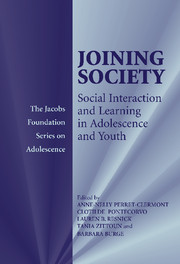Book contents
- Frontmatter
- Contents
- List of Contributors
- Foreword
- Preface
- I Introduction
- 1 Thinking Spaces of the Young
- 2 Prospects for Youth in Postindustrial Societies
- 3 Overview of the Volume
- II Youth-Constructed Socialization
- III Personal Agency Through Collective Activity
- IV Learning in Practice and Discourse
- V Intergenerational Sites for Thinking
- VI Pathways to Adulthood in National Context
- Index
- References
2 - Prospects for Youth in Postindustrial Societies
Published online by Cambridge University Press: 08 January 2010
- Frontmatter
- Contents
- List of Contributors
- Foreword
- Preface
- I Introduction
- 1 Thinking Spaces of the Young
- 2 Prospects for Youth in Postindustrial Societies
- 3 Overview of the Volume
- II Youth-Constructed Socialization
- III Personal Agency Through Collective Activity
- IV Learning in Practice and Discourse
- V Intergenerational Sites for Thinking
- VI Pathways to Adulthood in National Context
- Index
- References
Summary
The industrialized countries of Europe, North America, and Asia are now well into a period of economic transformation that appears to be as profound in its social effects as the Industrial Revolution itself. As strategies of production and distribution change dramatically, and as the movement of people and goods across national borders accelerates, the conditions in which adults live and children are raised are shifting. No groups in society are more profoundly affected by these changes than are adolescents and young adults, who are themselves in a period of personal transition from childhood to adulthood, from appropriate dependence on others to responsibility for the welfare of others, from preparation for future economic and civic participation to actual participation.
It is unclear to young people – and, when they are candid with the young, to their parents, mentors, and advisors – just how they should prepare. Those in positions of political and economic power and influence agree that a more highly educated workforce will be required in the future, a workforce able to participate in defining and evaluating their own work, rather than just following orders, and able to learn new skills several times during their working lives. It is assumed, therefore, that young people should spend substantial portions of their adolescence and young adulthood in some form of education and training. But no one knows exactly how this education ought to proceed.
- Type
- Chapter
- Information
- Joining SocietySocial Interaction and Learning in Adolescence and Youth, pp. 11 - 25Publisher: Cambridge University PressPrint publication year: 2003



